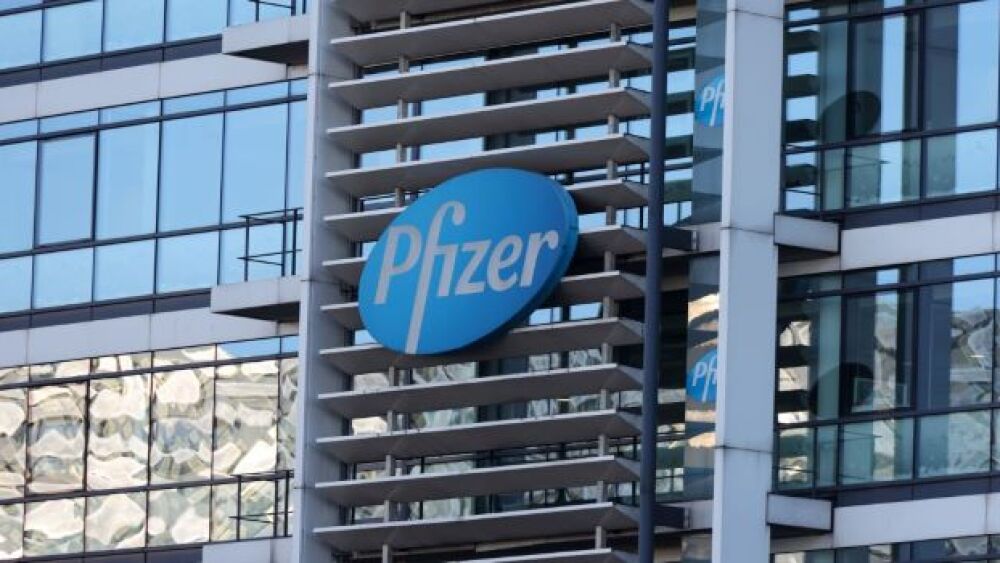Pfizer is lining up a potential New Drug Application for an ulcerative colitis treatment for patients who are not seeing an improvement in their condition from currently available options.
Pierre Suu/Getty Images
Pfizer is lining up a potential New Drug Application for an ulcerative colitis treatment for patients who are not seeing an improvement in their condition from currently available options, including its JAK inhibitor, Xeljanz.
This morning, Pfizer announced that etrasimod, its investigational, oral selective sphingosine 1-phosphate (S1P) receptor modulator, hit the mark in the late-stage ulcerative colitis ELEVATE 12 study. Pfizer gained etrasimod in its late 2021 $6.7 billion acquisition of Arena Pharmaceuticals.
The Phase III trial included UC patients who had previously failed or were intolerant to at least one conventional, biologic, or JAK therapy. Patients on the etrasimod arm received 2mg doses of the drug once daily.
Ulcerative colitis (UC) is a chronic and debilitating inflammatory bowel disease that affects an estimated 3.8 million people in North America and Europe. Symptoms can include chronic diarrhea with blood and mucus, abdominal pain and cramping, and weight loss. The disease can negatively impact on individuals, leading to interruptions of work, family life and social activities.
In the study, estrasimod demonstrated statistically significant improvements in clinical remission after 12 weeks compared to placebo. Additionally, Pfizer also said statistically significant improvements in all key secondary endpoints. Full results from the study were not released. However, Pfizer said it would present the complete data at a future conference.
The company noted that the safety profile remained consistent with earlier studies.
In Phase II ulcerative colitis studies, etrasimod demonstrated promise with a significant number of patients achieving clinical response, clinical remission, or endoscopic improvement. Additionally, data showed that patients in the study experienced sustained or improved effects up to week 46 in an open-label extension.
Michael Corbo, chief development officer of inflammation and immunology at Pfizer Global Product Development, said the positive Phase III data demonstrates that etrasimod could become a breakthrough option for UC patients who are not improving under currently available treatment options.
“This outcome represents a continuation of our effort to develop new therapeutic approaches to treat immuno-inflammatory diseases and address the need for oral therapies for UC patients with inadequate response, loss of response, or intolerance to conventional or advanced therapies,” Corbo said in a statement.
Pfizer said the data announced today, along with results from ELEVATE 52, are expected to form the basis for future regulatory filings with the U.S. Food and Drug Administration and other agencies. Results from the ELEVATE 52 study will be available by the end of the first quarter of this year.
In addition to UC, etrasimod is being investigated for immuno-inflammatory diseases, including Crohn’s Disease, atopic dermatitis, eosinophilic esophagitis and alopecia areata.
Also this week, two former Pfizer employees accused of stealing trade secrets to launch their own company have filed a counter lawsuit against the pharma giant. The Connecticut Law Tribune reported that Min Zhong and Xiayang Qiu filed a cross-claim declaring they own the patent rights to diabetes and obesity drugs that are the core assets of Regor Therapeutics and are at the center of a collaboration with Eli Lilly.
The Tribune reported that in their cross-claim, the two former Pfizer scientists said their business strategy was based on publicly available information and was not a trade secret. Zhong and Qiu are seeking declarations that they did not misappropriate any trade secrets from Pfizer. Also, they are seeking declarations that “they did not breach their contracts or other duties to the company, and that they own the patent applications in question.”
In February, Pfizer filed a lawsuit alleging that Xiayang Qiu and Ming Zhong misappropriated confidential data regarding an anti-obesity and diabetes drug in development at Pfizer to launch Regor.





